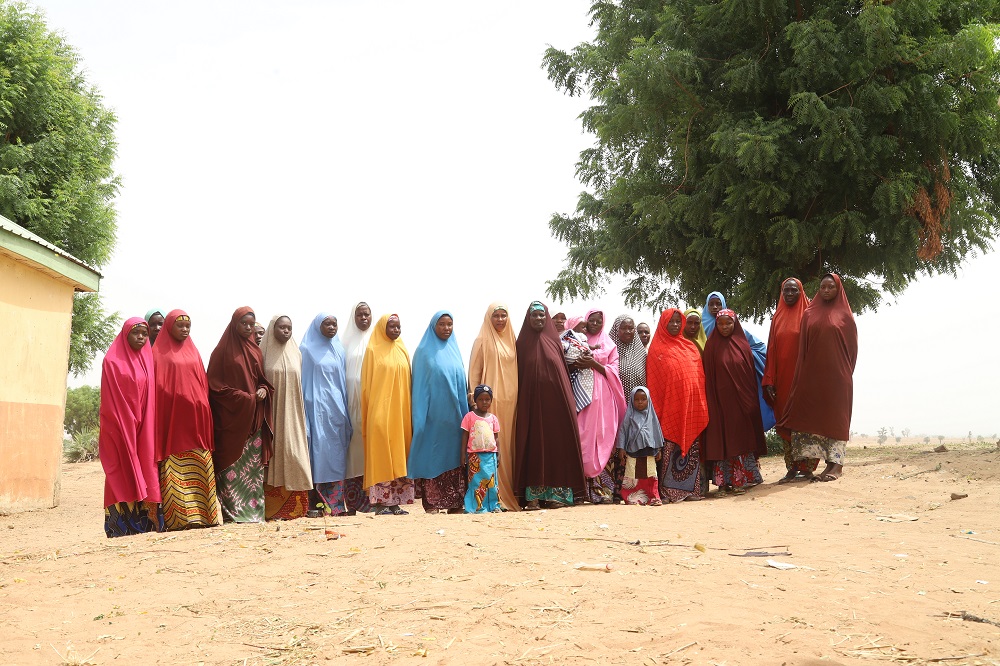Stretching out for miles without any sign of civilization, in what appears to be a people forgotten by its government; left to fend for themselves, is Panguru. Panguru is a hard-to-reach community in Billiri Local Government Area of Gombe state. The journey to Panguru in the beginning, seemed like a travel to nowhere. The land is vast, with terrains so rugged, and the ground, partly rocky and stickily muddy at the same time. To traverse this area in the rainy season, they say, is considered an act of bravery. However, ActionAid was not deterred!
Madam Victoria, as she is popularly called, the community facilitator, Panguru. She shared with so much excitement, how they ended up being a beneficiary community when ActionAid and its partners were rejected from a previous community. “I want to thank these organizations because we have benefitted a lot from them and we count ourselves lucky because the first community they went to, they were rejected, before coming to our community; which that community is now regretting now seeing all that we have gained,” she remarked.
The presence of ActionAid and its partners in Panguru has empowered the women. This was achieved through capacity-building training. in areas such as education, peaceful co-existence, household education, hygiene, human rights, and sustainable farming. “At the beginning when they came in, they taught us how to set up a cooperative and we came back and informed our community elders and we the women set up the cooperative and decided on a date that we will be meeting and we set up every Sunday. Every Sunday, we meet, deliberate, and teach. There are some books they gave to us and we use these books to teach ourselves; Women that do not know how to read and write, learned something during this period as a result of these organizations” As a result of this, we started taxing ourselves every week and ActionAid and Hope for the Lonely complemented our effort by empowering three women. Some livestock and others, groundnut for vegetable oil making. later, three more people were empowered and we continued growing and investing. They kept inviting us for a series of training in which I cannot count the number of trainings and they continued empowering us” Madam Victoria said.
To help themselves, “we were rotating the proceeds of the empowerment among ourselves every three months and were contributing money for our organization. We used the proceeds from this to buy a cow for the organization”
Also, as part of its intervention projects in Panguru, ActionAid built a healthcare facility. This facility, is only one available in the community. Without it the past, they had traveled the unpleasant terrain to get help when the need arose.
“Hope for the Lonely and ActionAid built a hospital for us in which in the past, we usually carry the sick on our heads to the neighboring towns of Billiri or Kashare even in the rains. But now that we have a hospital, things have improved; There was a time that we took a sick person on the head to go to the hospital and before we even got to the next community, the person died and we started coming back with a dead body. This was in the rain and on the muddy road that sticks up to your elbow, that time, Ponguru was almost like a forest She said. “In the past, sick persons were carried on the head but now, there is an improvement as a result of the hospital” Madam Victoria retells a painful experience.
Madam Victoria also shared how she was empowered with a cow and how it has impacted her, her family, and her household. “I was empowered with a cow. The cow is helping us. During the farming season, we use the cow to make ridges; we cannot take money to pay for a cow to do that for us because we have ours that we can use. When it is time to sell the cow, we can sell it and use the profit to buy a small one and keep it; all of which is part of the benefit; In the area of my family, when it is time to pay my children’s school fees and I don’t have money, we can use the cow to work on the farm to raise money to pay school fees, buy food and even buy some household items”

